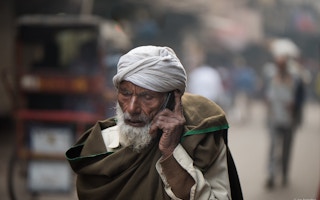In the first two months of 2024, millions of people, from voters in Pakistan to families forced to flee Sudan’s civil war, were plunged into digital darkness as governments, and others, imposed internet shutdowns.
In a bumper year for elections, digital rights activists fear more blackouts as governments, or other powerful forces, seek to control what people do or see online.
Here is a look at where and why internet shutdowns have happened and what the predictions are for the year ahead.
Where have internet shutdowns been most prevalent in 2024?
According to the global charity Internet Society, there have been 13 cases of internet shutdowns in the first two months of 2024, compared to two cases over the same period last year.
Digital blackouts have affected people in India, Pakistan, war-crippled Sudan, Senegal, Comoros and Chad.
Regional authorities in India’s West Bengal, Uttarakhand and Rajasthan states suspended internet services for a variety of reasons, including, they said, to calm violence and prevent cheating in civil service exams.
Why do governments shut down the internet?
Governments typically say they shut down the internet to maintain public order, prevent the spread of misinformation that could incite violence, safeguard national security, or ensure the integrity of examinations or sensitive events.
Some governments have, in the past, also said internet shutdowns were needed to combat terrorism, protect against cyber threats, or enforce regulations related to content moderation or illegal activities online.
However, digital rights campaigners say the real reasons often include the desire to suppress dissent, silence opposition, and control the flow of information - all actions that can undermine fundamental rights such as freedom of expression and access to information.
In Senegal, authorities said they cut mobile data access in February to curb the spread of “hateful and subversive messages” after people took to the streets to protest the postponement of presidential elections.
In Pakistan, authorities ordered mobile internet and phone services to be suspended for security reasons during presidential and national elections on Feb. 8.
While most shutdowns have been imposed by governments, in Sudan internet blackouts have been blamed on the paramilitary Rapid Support Forces, who have been fighting the army for nearly a year in a civil war that has killed thousands, displaced almost 8 million, and sparked warnings of famine.
Industry sources have said RSF soldiers said they would cause a blackout unless engineers restored service to the western Darfur region, which the RSF controls and which has been cut off from the internet for months. The RSF have denied the allegations.
How do internet shutdowns affect people and economies?
Internet shutdowns disrupt vital communication channels, lead to separation anxiety and hinder access to essential services like healthcare and education. Businesses also suffer as service platforms and payment systems go dark.
The effects are especially acute during conflicts or emergencies. In Sudan, the blackout has hobbled aid deliveries and left millions of desperate people isolated and unable to buy vital goods using the e-wallets most now depend on given a widespread cash shortage.
Internet shutdowns can also restrict access to information and foster a culture of fear and censorship. In Senegal, internet advocacy watchdog Access Now said blackouts could be facilitating the spread of misinformation.
In India’s northern state of Haryana, an internet shutdown in the wake of protests by farmers meant children attending online classes were not able to learn, examinations were postponed, and healthcare workers could not attend quickly to emergencies.
How are people trying to circumvent these blackouts?
Citizens try to get around internet shutdowns by adapting to restrictions and finding alternative ways to stay connected.
One common method - used in the past in Nigeria and Uganda during social media shutdowns - involves using virtual private networks (VPNs), which encrypt internet traffic and reroute it through servers in other countries, bypassing restrictions.
Additionally, some people in India use free software Tor to anonymise internet activity by routing it through a decentralised network of volunteer-operated servers.
In Sudan, people access the internet through satellite connections or foreign SIM cards. It has been reported that the RSF is also using Elon Musk’s Starlink services.
In India, offline communication methods such as mesh networks, which enable devices to connect directly with one another without relying on centralised infrastructure, are increasingly popular in areas prone to internet shutdowns.
Whatever workarounds people find, however, they are likely to eventually encounter new restrictions as governments tend to respond with more sophisticated censorship techniques.
Are we likely to see more digital blackouts in 2024?
According to the Internet Society, there were 124 cases of internet shutdowns last year and digital rights activists predict that this is likely to increase in 2024, largely due to the number of elections scheduled around the world.
National elections are due to be held in at least 64 countries, determining representatives for nearly half the world’s population.
The risk of internet shutdowns rises during elections as officials seek to control access to information, often saying they need to stop the spread of social unrest, false news and hate speech.
Among those countries holding votes this year, 24 have imposed shutdowns in the past, accounting for a combined population of 2.8 billion people. These include India, Mozambique, Venezuela and South Sudan and Chad.
“With billions of people at risk of shutdowns in 2024 during election periods alone, the stakes for democracy and human rights this year are higher than ever,” Access Now said on its website.
This story was published with permission from Thomson Reuters Foundation, the charitable arm of Thomson Reuters, that covers humanitarian news, climate change, resilience, women’s rights, trafficking and property rights. Visit https://www.context.news/.

















